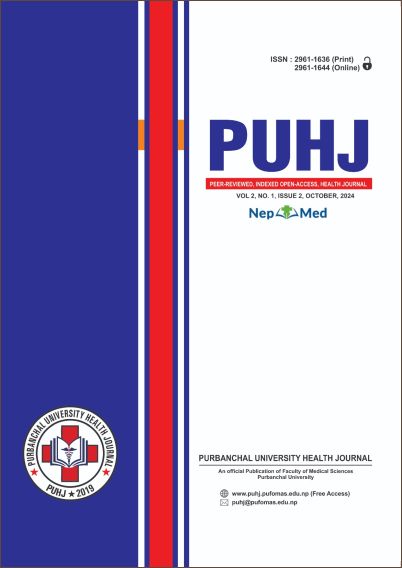Knowledge Regarding Attention Deficit Hyperactivity Disorder among School Teachers at Biratnagar, Nepal
DOI:
https://doi.org/10.3126/puhj.v2i1.74946Keywords:
Attention, Deficit, Hyperactivity Disorder, Knowledge, School TeachersAbstract
Introduction: Attention Deficit Hyperactivity Disorder is the common behavioral condition of childhood. Teachers hold a significant responsibility in identification, recommendation and management of Attention Deficit Hyperactivity Disorder. Their knowledge is of direct benefit to students with Attention Deficit Hyperactivity Disorder and their families.
Objective: The objective of the study were to assess the teachers level of knowledge regarding Attention Deficit Hyperactivity Disorder and to find out the association between teachers level of knowledge and the selected sociodemographic characteristics at Biratnagar, Nepal.
Method: A descriptive cross-sectional study was conducted among 180 school teachers in Biratnagar, Nepal, from August 2021 to July 2022. Ethical approval was obtained from the Institutional Review Committee of Purbanchal University School of Health Sciences and informed consent was obtained from all study participants. School teachers were randomly selected for data collection from six government schools. A standard tool Knowledge of Attention Deficit Disorders Scale designed by Sciutto and colleagues was used. Collected data were analyzed using statistical Package for the Social Sciences (SPSS ) version 21. Both descriptive and inferential statistics were used for data analysis.
Result: Among 180 participants, only 16.1 % had adequate knowledge and majority 83.9 % of the respondents had inad-equate knowledge regarding Attention Deficit Hyperactivity Disorder. A significant association was observed between knowledge level and age (p=0.024) and subject taught (p=.001) at p<0.05 level of significance.
Conclusion: In this study, majority of the teachers had inadequate knowledge regarding Attention Deficit Hyperactivity Disorder. It is important to provide in-service education and consistently raise public awareness through media about behavioral issues like Attention Deficit Hyper Activity disorder.
Downloads
Downloads
Published
How to Cite
Issue
Section
License
Copyright (c) 2024 The Author(s)

This work is licensed under a Creative Commons Attribution-NonCommercial 4.0 International License.
This license enables reusers to distribute, remix, adapt, and build upon the material in any medium or format for noncommercial purposes only, and only so long as attribution is given to the creator.




